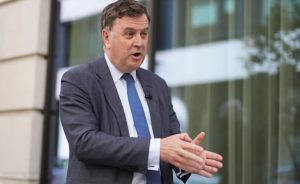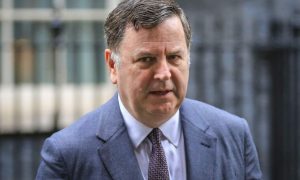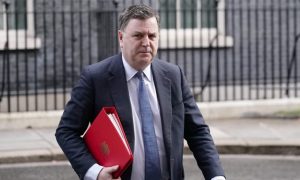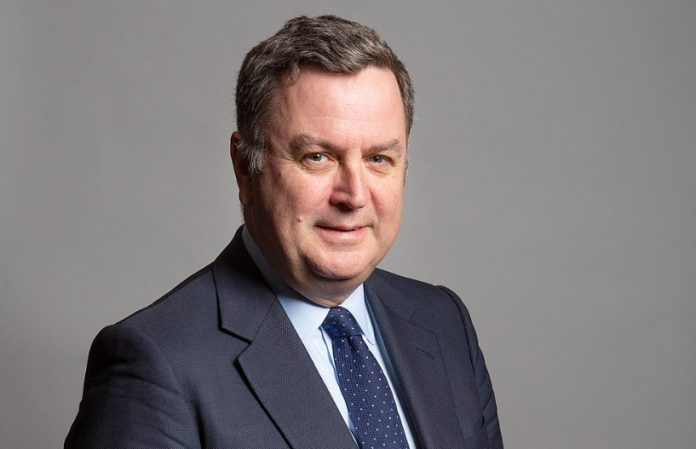Table of Contents
In the ever-evolving landscape of British politics, it’s not unusual to wonder how financially successful our public representatives are.
As someone closely observing the movements within Westminster, I find Mel Stride’s journey particularly interesting.
Having moved through high-ranking political positions and once owning a successful business, Stride presents a case worth exploring. So, how wealthy is Mel Stride in 2025? Let’s break down the facts.
Who Is Mel Stride and What Is His Political Background?

Image – Source
Mel Stride, born in Ealing, Middlesex, in 1961, has played an active role in UK politics for over a decade.
After completing his education at Portsmouth Grammar School, he went on to study Philosophy, Politics and Economics (PPE) at St Edmund Hall, University of Oxford, where he became president of the Oxford Union.
His academic and debating achievements helped lay the groundwork for a political career rooted in strong economic understanding.
He became the Member of Parliament for Central Devon in 2010. Since then, Stride has built a track record of parliamentary service in various roles.
Early in his career, he served as a Parliamentary Private Secretary before moving into frontbench positions. His ministerial journey includes being Lord Commissioner of the Treasury, Financial Secretary to the Treasury, and later Leader of the House of Commons.
Stride also spent time on the backbenches, most notably chairing the influential Treasury Select Committee from 2019 to 2022. His return to the Cabinet came in 2022 as Secretary of State for Work and Pensions under Prime Minister Rishi Sunak.
Despite the Conservative Party’s defeat in the 2024 election, Stride remained politically significant, eventually becoming the Shadow Chancellor of the Exchequer under Kemi Badenoch.
What Is Mel Stride’s Net Worth in 2025?
Mel Stride’s estimated net worth in 2025 is between £1 million and £2 million. This estimation is based on public records of his parliamentary salary over the past 15 years, his prior business ventures, and his additional income from ministerial roles.
Compared to the average UK MP, whose net worth often aligns with or slightly exceeds their salary due to allowances and pensions, Stride’s wealth positions him comfortably above the norm.
However, he does not fall into the bracket of the ultra-wealthy within Parliament, many of whom benefit from inherited wealth, private business ownership, or financial portfolios.
His consistent presence in high-ranking financial and policy-based government roles further solidifies this financial standing. While he has not pursued a lavish public lifestyle, the nature of his roles and past business interests contribute to this valuation.
How Did Mel Stride Make His Money?
Mel Stride’s wealth stems from a combination of private enterprise, public service, and long-term financial prudence.
His earnings are not the result of a single source but rather a blend of business success and sustained income from a political career that spans over a decade. Let’s explore the different avenues that contributed to his financial portfolio.
Business Foundations: Venture Marketing Group
Stride’s most notable financial venture before entering politics was the founding of Venture Marketing Group in 1987. He established the company alongside his wife, Michelle Stride.
The firm specialised in organising trade exhibitions, producing professional publications, and running conferences across various sectors.
What set Venture Marketing Group apart was its reach and consistent growth. The company eventually expanded into international markets, including the United States. This expansion enhanced its revenue potential and raised its commercial profile significantly.
The business model focused on:
- Trade exhibitions for career fairs and industry-specific events
- Corporate publishing and conference management
- Strategic partnerships in both UK and US markets
This entrepreneurial phase played a crucial role in shaping Stride’s early financial success and gave him the independence to pursue politics without financial strain.
Sale of US Operations and Wind-Down
At a certain point, the US arm of Venture Marketing Group was sold. Although exact financial figures from the sale remain undisclosed, it is widely believed to have generated a significant one-off return.
The sale likely contributed a substantial portion to his early net worth and gave him the freedom to transition away from day-to-day business management.
Stride began stepping back from active business roles in the mid-2000s. By 2007, he had resigned as a company director and fully divested himself from business operations by December 2020. This move coincided with his deepening focus on parliamentary responsibilities.
Director Roles and Investment Involvement
Throughout the 1990s and early 2000s, Stride was listed as a director in multiple companies related to publishing and events. While the majority of these entities were tied to his core business, they suggest a diversified income structure within his commercial career.
He has not been publicly associated with significant investment portfolios or property empires, unlike some of his parliamentary colleagues. Instead, his wealth appears to be built on earned income rather than inherited or speculative wealth.
What Roles Have Boosted Mel Stride’s Income Over the Years?

Image – Source
Stride’s career in Parliament has not only advanced his influence but also provided a structured and consistent income.
While the base salary of an MP is significant, his earnings were notably enhanced through additional leadership roles and ministerial responsibilities. Here’s a detailed breakdown of those roles and how they contributed to his financial standing.
Member of Parliament for Central Devon (2010–Present)
Stride has served as MP for Central Devon since its creation in 2010. As of 2025, the basic salary for an MP is approximately £86,584, excluding allowances for staff, office costs, and travel.
While being an MP is a full-time commitment, the salary alone, when sustained over a 15-year period, contributes significantly to long-term wealth, especially when managed carefully and supplemented by earlier business earnings.
Ministerial Appointments and Salary Increases
Stride’s first major financial jump in parliamentary earnings came through his appointment to ministerial roles. Each of these positions comes with an uplift to the basic MP salary.
Lord Commissioner of the Treasury (2015–2017)
As a junior whip, Stride received additional compensation, bringing his total remuneration well above the MP base rate. Although not a high-profile role, it marked his ascent into government.
Financial Secretary to the Treasury (2017–2019)
This was a senior ministerial post, responsible for key financial and tax policies. The role came with a salary exceeding £98,000, positioning him among the better-paid ministers of the time. His influence over economic policy also increased his national profile.
Leader of the House of Commons (May–July 2019)
Though a short tenure, the Leader of the House of Commons is considered a senior cabinet position. The salary for this role is among the highest in government, typically over £104,000. The position also signals trust from party leadership, which can lead to other prominent appointments.
Committee Leadership and Parliamentary Recognition
Chair of the Treasury Select Committee (2019–2022)
Committee chairs in Parliament receive a supplementary salary, generally around £15,000 in addition to the MP base pay. As Chair of the Treasury Select Committee, Stride oversaw financial policy scrutiny and engaged with the Bank of England, HMRC, and financial regulators.
This role enhanced his reputation for fiscal competence and placed him at the centre of parliamentary economic discussions. Although not a Cabinet role, it carries prestige and financial benefit.
Secretary of State for Work and Pensions (2022–2024)
This Cabinet role is one of the most influential in government, overseeing the Department for Work and Pensions (DWP). The salary package is typically around £154,000 per year.
In this role, Stride led policy on state pensions, benefits, and employment initiatives. He also addressed long-term challenges such as the triple lock pension system. His leadership during this period was central to Conservative welfare policy.
Shadow Chancellor of the Exchequer (2024–Present)
Following the 2024 general election and leadership change within the Conservative Party, Stride was appointed Shadow Chancellor. While opposition shadow roles are paid less than their government equivalents, they remain salaried and come with various party allowances.
Although exact figures vary depending on seniority and administrative duties, senior shadow cabinet members typically receive enhanced remuneration through party funds and expenses coverage.
Has Mel Stride Been Involved in Any Financial Controversies?

Image – Source
Mel Stride has generally maintained a reputation for professionalism and financial prudence. However, in April 2019, while serving as Financial Secretary to the Treasury, he came under scrutiny for comments related to the Loan Charge, a controversial government policy intended to recover taxes from disguised remuneration schemes.
Some MPs alleged that Stride’s statements breached the Ministerial Code by being potentially misleading or insensitive to those affected by the policy.
Despite the criticism, there was no formal action taken against him. The issue remained a point of debate but did not evolve into a formal scandal.
This incident remains the only notable instance in which Stride’s financial decision-making was questioned, and it was confined to a policy debate rather than personal conduct.
What Is Mel Stride’s Position in the Conservative Party Now?
Stride currently serves as the Shadow Chancellor of the Exchequer, a key position within the opposition.
Following the Conservative Party’s loss in the 2024 general election, he was initially named Shadow Secretary of State for Work and Pensions in the caretaker cabinet led by Rishi Sunak.
In mid-2024, Stride announced his candidacy for Conservative Party leadership. Despite an initial strong showing, he was eliminated after the second round of MP voting.
Kemi Badenoch eventually secured the leadership and subsequently appointed Stride to her shadow cabinet.
In this role, he is responsible for critiquing and offering alternatives to the government’s fiscal policy.
His background in both business and finance makes him a relevant figure in economic discussions, and his presence in the Shadow Cabinet signals the party’s intent to retain experienced hands in leadership.
How Does Mel Stride’s Wealth Compare to Other UK Politicians?
Stride’s net worth of £1–2 million is moderate when compared to the wider financial spectrum of UK MPs.
Some MPs, particularly those with inherited wealth or major private investments, have net worths well above £10 million. Others may be closer to the average MP salary range with minimal additional wealth.
Stride’s profile places him in the upper-middle tier. His entrepreneurial background provided an initial boost, and over 15 years in Parliament—with roles that came with additional remuneration—added to that base.
He is not known for high-profile property acquisitions or business ventures while in office, indicating a relatively steady and measured approach to personal finance.
His transparency and clean record, save for minor criticisms during his Treasury tenure, contribute to a public perception of financial integrity.
What Can We Learn From Mel Stride’s Financial Journey?

Image – Source
Mel Stride’s journey from entrepreneur to senior politician highlights a well-managed career built on steady progress and calculated decisions.
His ability to transition from business to politics shows how experience in the private sector can be leveraged in public service.
Unlike some career politicians who enter Parliament early and rely solely on political income, Stride brought with him a wealth of real-world financial and managerial experience.
His career trajectory also shows the long-term value of holding multiple roles within government. Each successive role, particularly those in the Treasury and Department for Work and Pensions, added credibility and compensation, gradually elevating his net worth.
Stride’s example may serve as a guide for professionals looking to enter politics with a solid foundation and a measured, ethical approach to both governance and personal finance.
Mel Stride’s Key Roles & Income Overview
| Role | Duration | Approximate Annual Salary | Notable Contributions |
| MP for Central Devon | 2010–Present | £86,584 | Constituency service, legislative work |
| Financial Secretary to the Treasury | 2017–2019 | £98,000+ | Fiscal policy development |
| Leader of the House of Commons | 2019 | £104,000+ | Parliamentary scheduling |
| Chair, Treasury Select Committee | 2019–2022 | ~£15,000 (additional) | Economic and banking oversight |
| Secretary of State for Work & Pensions | 2022–2024 | £154,000 | Welfare reform, state pension discussions |
Final Thoughts: Is Mel Stride’s Net Worth Reflective of His Career?
Looking at his long-standing political involvement and prior business ventures, I’d say his net worth reflects a modest but well-earned success.
He has not been associated with extravagant lifestyles or excessive personal wealth. Rather, his earnings align with what one would expect from a senior politician with a successful entrepreneurial background.
In 2025, as Shadow Chancellor, Stride continues to play a central role in shaping Conservative fiscal policy. His wealth, while notable, doesn’t overshadow his contributions or political relevance.
FAQs About Mel Stride’s Net Worth
What is Mel Stride’s estimated net worth in 2025?
Mel Stride is estimated to have a net worth between £1–2 million in 2025, based on his political earnings and business ventures.
Did Mel Stride own a business before entering politics?
Yes, he co-founded Venture Marketing Group with his wife, which specialised in trade exhibitions and publishing.
How much do UK MPs like Mel Stride earn annually?
MPs earn a base salary of approximately £86,584. Additional roles such as ministers or committee chairs come with extra income.
Was Mel Stride ever involved in a financial scandal?
He faced some criticism over the Loan Charge issue in 2019, but no formal proceedings or penalties followed.
What political roles contributed most to Mel Stride’s wealth?
Senior roles like Secretary of State for Work and Pensions and Financial Secretary to the Treasury significantly boosted his income.
Is Mel Stride still active in UK politics in 2025?
Yes, he currently serves as the Shadow Chancellor of the Exchequer under Kemi Badenoch’s leadership.
How does his wealth compare to other senior Conservative MPs?
While he is not among the wealthiest, his net worth places him comfortably above the average MP in financial terms.
Featured Image – Source


